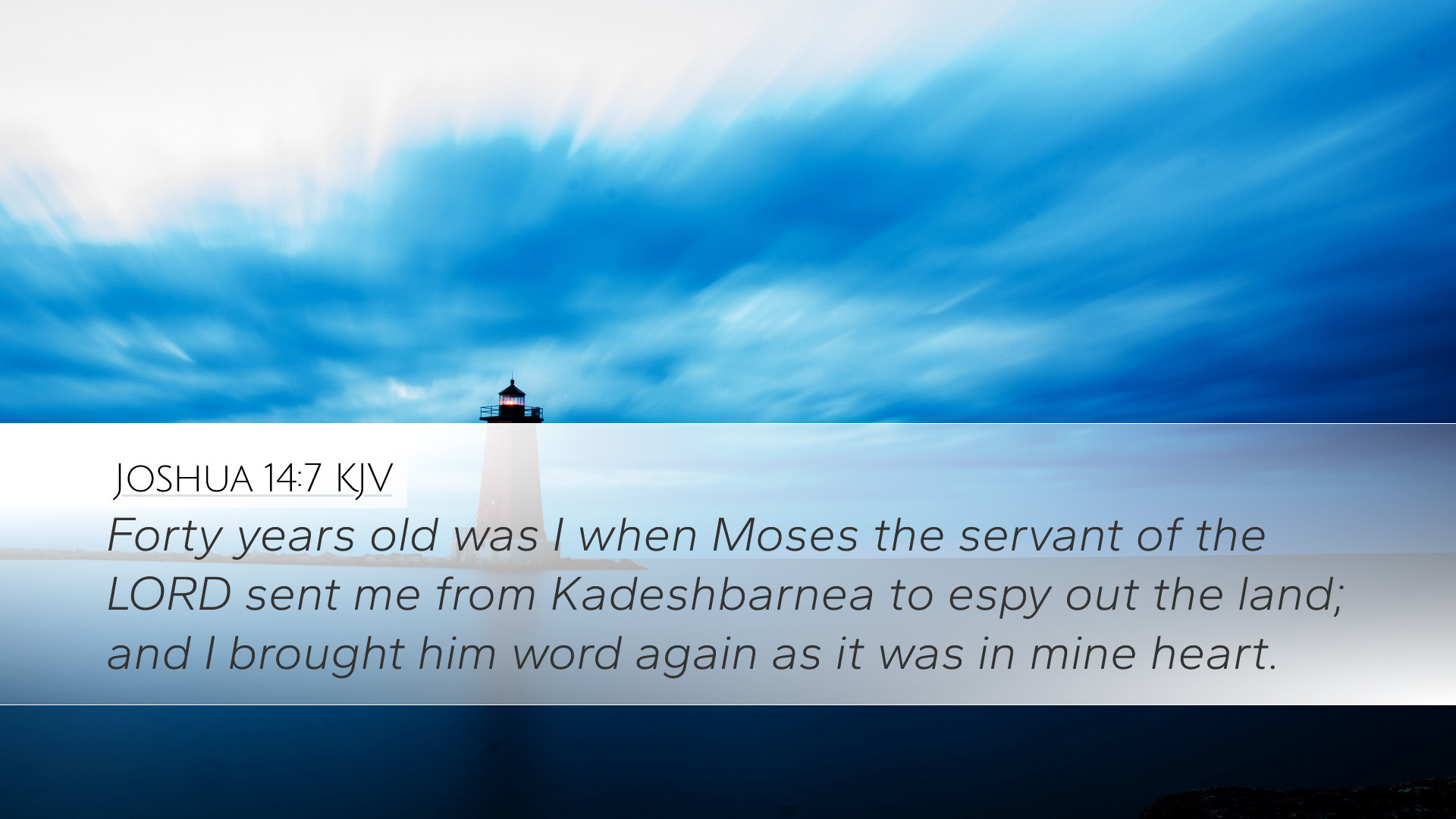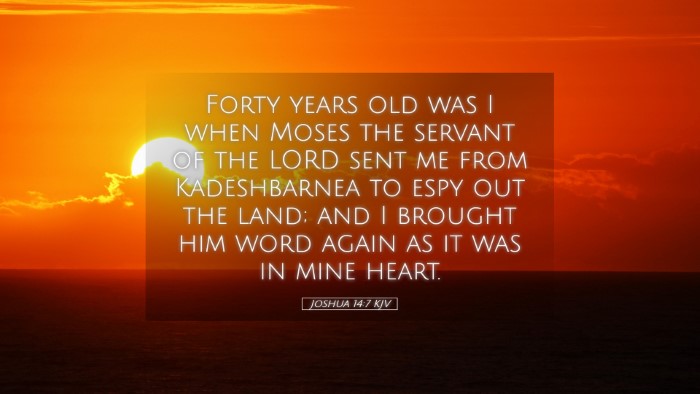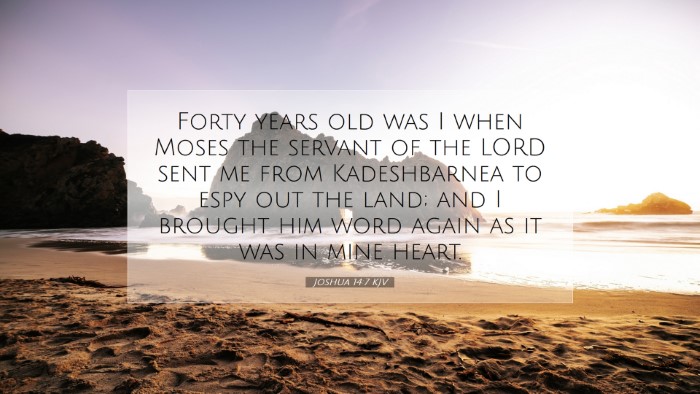Old Testament
Genesis Exodus Leviticus Numbers Deuteronomy Joshua Judges Ruth 1 Samuel 2 Samuel 1 Kings 2 Kings 1 Chronicles 2 Chronicles Ezra Nehemiah Esther Job Psalms Proverbs Ecclesiastes Song of Solomon Isaiah Jeremiah Lamentations Ezekiel Daniel Hosea Joel Amos Obadiah Jonah Micah Nahum Habakkuk Zephaniah Haggai Zechariah MalachiJoshua 14:7
Joshua 14:7 KJV
Forty years old was I when Moses the servant of the LORD sent me from Kadeshbarnea to espy out the land; and I brought him word again as it was in mine heart.
Joshua 14:7 Bible Commentary
Commentary on Joshua 14:7
Verse: "I was forty years old when Moses the servant of the LORD sent me from Kadesh Barnea to spy out the land; and I brought back word to him as it was in my heart."
Overview
This verse is a crucial part of Caleb's testimony as he recalls his experience as a spy sent by Moses to survey the Promised Land. His recollection not only serves as a historical account but also as an affirmation of faith and perseverance through trials. Here we explore the insights provided by notable commentators such as Matthew Henry, Albert Barnes, and Adam Clarke.
Historical Context
Caleb's speech occurs in a pivotal moment in Israel's history. After forty years of wandering in the wilderness due to the disobedience of the ten spies, Caleb stands as a testament to faithfulness and courage. He recalls his youth and the moment he took a stand for God's promise despite the overwhelming doubts of his peers.
Insights from Commentaries
-
Matthew Henry's Commentary
Henry emphasizes the faith of Caleb, contrasting it with the fear of the other spies. He points out that Caleb had a 'different spirit' (Numbers 14:24), which led him to follow God wholeheartedly. His faithful report was not only accurate but reflected an inner conviction—a "word in his heart" that sustained him through years of waiting. This demonstrates the importance of internal spirituality and the conviction to act according to God’s promises.
-
Albert Barnes's Notes
Barnes highlights Caleb's age and vitality, suggesting that despite being 40 years old at the time of the spying, his faith remained undiminished over the next 45 years of desert wandering. His request for the mountain of Hebron reflects not only his strength and bravery but also the promise of God. This desire for Hebron symbolizes the culmination of his life's journey and his long-held faith. Barnes encourages believers to reflect on Caleb's unwavering faith as a model for endurance and hope.
-
Adam Clarke's Commentary
Clarke delves into the significance of Caleb's role as a spy and implies the psychological aspect of his courageous spirit. He emphasizes that Caleb saw beyond the giants in the land; his report was filled with confidence in God’s power. Clarke notes the importance of having a heart that is aligned with God's promises. He encourages readers to recognize that faith often stands in stark contrast to popular opinion and fear, urging pastors and theologians to lead their congregations into the fullness of God's calling.
Theological Implications
The recollection in Joshua 14:7 serves as a significant lesson in leadership and faithfulness. The theological ramifications of Caleb's testimony extend into various areas:
-
Faith vs. Fear:
Caleb’s faith showcased the victory of belief in God’s promises over the fear that gripped the majority. This timeless struggle is relevant in the church today, reminding leaders to cultivate faith among their congregations.
-
Endurance in Trials:
Caleb's decade-long wait exemplified spiritual endurance. For pastors facing challenges, it highlights the need for patience and steadfast trust in God's timing.
-
God's Promises:
Caleb's recollection serves as a reminder of the importance of holding on to God’s promises. This historical narrative can be applied as an encouragement for believers to claim divine promises as they navigate their spiritual journeys.
Practical Applications
From the reflections garnered through these commentaries, several practical applications emerge:
-
Personal Reflection:
Encourage individuals to reflect on their own 'spiritual journeys' and recognize areas where faith is challenged by fear and doubt.
-
Congregational Teaching:
Pastors can draw from Caleb’s story to teach about the importance of faithfulness and integrity, especially in leadership positions.
-
Community Building:
Highlight the need for community support where believers can encourage one another as Caleb did, focusing on unity in faith despite life's obstacles.
Conclusion
Joshua 14:7 encapsulates a moment of significant faith that transcends time. Through careful reflection on the commentaries by Henry, Barnes, and Clarke, we gather wisdom about the nature of faith, endurance, and the importance of adhering to God’s promises. As Caleb exemplifies a spirit of courage and steadfastness, so too are we called to imbibe these virtues in our own lives as we embark on our faith journeys.


